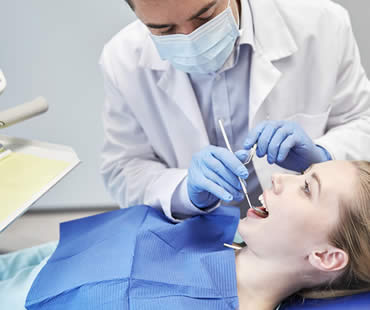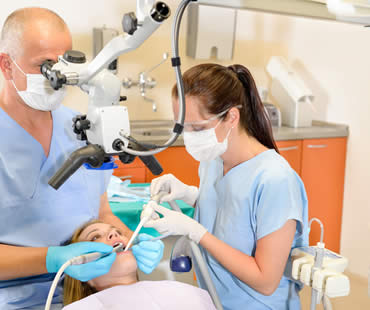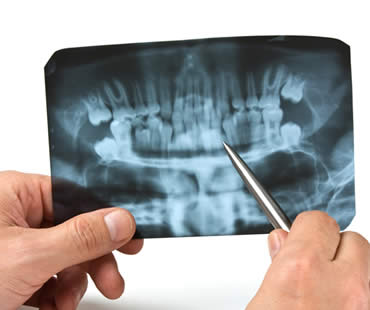
If you didn’t have your wisdom teeth out as a young person, you may be wondering about having them out as an adult. Your dentist may have recommended that you prevent future infections, cysts or pain in the jaw due to wisdom teeth that are growing under other teeth – known as impacted teeth. Even a type of tumor has been linked to impacted wisdom teeth.
Impacted teeth result when the wisdom tooth grows up under an existing tooth. Sometimes, adults have wisdom teeth that come in completely straight behind back molars. In rare cases, one or more of these teeth don’t grow at all. An x-ray can reveal the presence of the teeth. Impacted teeth cause problems with existing teeth and must come out.
Because the roots of wisdom teeth typically fully develop near the age of 24, removing them after this time can be more complicated. Roots can entwine with facial nerves, making extraction problematic. It’s recommended that adults receive a CT scan of their jaw, showing the clear positioning of facial nerves and roots, something not shown by x-rays. If the roots of the lower wisdom teeth aren’t touching or wrapped around the alveolar nerve, extraction is still possible.
Adults with wisdom teeth are at higher risk for gum disease. Gum disease has been linked to an increase of pregnancy complication and other health issues. Previously believed only to affect patients in their late 30s, this gum disease is now being shown to affect much younger patients, especially young pregnant women. Growing evidence is also connecting gum disease to inflammation due to chronic infections in the body, leading to an increased risk of diabetes and heart disease.
Talk to your dentist today to see if you should have your wisdom teeth removed. Be honest about any symptoms you’re having, such as pain or pressure, and let the professional evaluate your specific situation.
If you live in the Ottawa area contact us today

A wisdom tooth is often extracted to correct an existing dental problem or to prevent the possibility of problems that may arise in the future. Some problems associated with wisdom teeth are:
- Your jaw may be too small to accommodate the eruption of your wisdom teeth, leading them to become impacted (stuck in the jaw, often under the edge of an adjacent tooth) and unable to erupt through your gums.
- Your wisdom teeth may partially erupt, leaving a flap of soft gum tissue to grow over the tooth. Food, bacteria and germs can get trapped underneath this gum flap, leading to swelling, redness and pain, which are signs of infection.
- Impacted teeth can lead to a more serious problem, such as acute infection, damage to the surrounding teeth, damage to the bone or the development of a cyst.
- Wisdom teeth can present at an awkward angle, coming in with the top of the tooth facing sideways, forward or backward.
Removing your wisdom teeth can be a good method to prevent:
- crowding at the back of the mouth
- an impacted wisdom tooth stuck in the jaw and never erupting
- painful gums or infection caused by a flap of gum skin
- gum disease or tooth decay in the individual wisdom tooth or in the surrounding teeth and gums
You may want to have your wisdom teeth removed when you are younger because:
- The younger you are, the less developed your wisdom teeth roots are, and the less dense your jawbone, allowing for an easier extraction of the tooth.
- The majority of problems with wisdom teeth begin between the ages of fifteen and twenty-five.
- If you have a medical condition that is known to worsen with time, you may choose to have your wisdom teeth out early, while you are in your best health, to facilitate maximum healing.
Wisdom teeth extraction is rarely harmful, but there are risks associated with any surgery. Talk to your dentist today about any concerns you have regarding wisdom tooth extraction.
If you live in the Ottawa area contact us today

Some people would rather endure tooth pain than have their wisdom teeth extracted during surgery. Most of the time, fears are based on irrational tales that people read on the internet or hear from others. The truth is that wisdom tooth surgery is extremely common and most oral surgeons perform them every day without complications. The best way to overcome fear is to learn more about the procedure and recovery.
Procedure:
Extracting wisdom teeth involves opening the gums above the tooth and removing any bone that is blocking the tooth’s ability to erupt. The tissue will be separated to be able to remove the tooth, sometimes even in pieces if necessary. In some cases when bone is removed, a bone graft is needed to replace it. After the procedure is complete, stitches will be placed that will dissolve with time. If this sounds awful, remember that patients don’t feel any pain during the procedure due to sedation and usually don’t even recall anything that happened during treatment.
Recovery:
There are some common outcomes to be expected after wisdom tooth extraction, all of which usually subside within a few days as long as you follow your surgeon’s instructions. Have someone accompany you to and from the appointment so they hear the recovery directions and so you don’t drive. Afterwards, you will be given gauze to bite on at the extraction site. Bite gently on the gauze and change it frequently. Avoid lying flat on your back because bleeding may increase. If you experience swelling, hold ice packs on the outside of your cheeks for the first day. Eat soft foods and avoid using a straw for the first few days, and try not to touch the area with your fingers or tongue. Do not smoke for at least 24 hours after oral surgery. If you follow all these guidelines and any others that your doctor provides, there are few risks and no reason to be afraid of wisdom tooth extraction.
If you live in the Ottawa area contact us today

Most dental professionals recommend having third molars, or wisdom teeth, removed in early adulthood, preferably before they are fully formed and rooted into the jaw. Generally, this means having wisdom teeth extracted between the ages of 17 and 25. Waiting until you are older to have wisdom teeth removed can have considerable risks and complications.
Wisdom teeth that are not removed create the following risks:
- Impaction caused by wisdom teeth that do not have sufficient room to grow, causing pain and potential disease and damage to adjacent teeth.
- Tooth decay from wisdom teeth that are difficult to keep clean.
- Infection caused by bacteria that is harbored in the wisdom tooth eruption site.
- Growth of tumors and cysts caused by severely impacted wisdom teeth.
For patients who need to have wisdom teeth removed later in life, complications can include:
- More complicated removal surgery to eliminate deeply rooted or impacted wisdom teeth that results in longer surgery recovery time.
- Roots that have grown close to the nerve that affects the feeling in the lower lip might be injured in surgery, causing permanent nerve damage.
If you or your young adult have emerging wisdom teeth, schedule a consultation with your dentist to determine if and when they should be removed. While some patients will not need to have their third molars extracted, in most cases, having wisdom teeth removed as they are erupting can help to avoid a host of future problems. When wisdom tooth extraction is performed early, recovery time and risk of complications are drastically reduced for most patients.
If you need a dentist in Ottawa contact us today

Wisdom teeth are really just your third molars, located in the very back of your tooth arch and are the last of your adult teeth to erupt. They most commonly erupt between the ages of 17 and 20. Most people have them, but for some people, these third molars simply do not develop. Some patients might have more than one set of wisdom teeth! Only an x-ray can reveal the complete story.
A high number of patients who possess wisdom teeth don’t know they have them because the teeth are impacted, or stuck underneath already erupted teeth, as opposed to erupting normally through the gums. This is when wisdom teeth become problematic.
The patient’s jaw may be too small to allow for the full eruption of the wisdom tooth, leading to it becoming stuck in the jaw, pushing at other teeth, causing pain and shifting of the teeth. The tooth might be able to erupt partially, triggering a flap of gum tissue to develop over the tooth, trapping bacteria and germs which can lead to serious infection.
Sometimes wisdom teeth come in at strange angles, facing sideways or backward, or they develop a serious infection and damage the surrounding teeth. They can also lead to the development of a cyst or cause damage to the jawbone.
If your dentist has told you that you need to have your wisdom teeth out, it’s a good idea to listen and to follow that advice. Removing problematic wisdom teeth can reduce crowding in the mouth, infection in the gums or tooth decay in the wisdom tooth or in the surrounding teeth.
The younger you are when you have your wisdom teeth removed, the easier it is to recover. Ask your dentist to learn more about wisdom teeth and about your particular needs as a patient.
Schedule your appointment at our Ottawa dental office

Wisdom teeth got their name because they are the final teeth to develop, usually in the late teens to early twenties, at a time when a person becomes fully mature or “wise.” Wisdom teeth are the third and final set of molars in the very back of the mouth. Most people have four total (two upper and two lower), but others never develop them at all. Wisdom teeth can be a valuable chewing aid, but often they are poorly aligned or don’t develop properly.
How do I know if I have them?:
Unless you start to feel them breaking through, you may not know whether you have wisdom teeth or not. Ask your dentist to examine you to see if these teeth are healthy and properly positioned. An x-ray may be required, and your dentist may refer you to an oral surgeon to be evaluated further.
Do wisdom teeth hurt?:
You don’t always feel anything with your wisdom teeth, but sometimes they are very bothersome. You may experience pain when they erupt in awkward positions, especially if the teeth rub against your mouth. Other problems include stiffness in the area, infected swelling of the gums, tooth decay, gum disease, and tooth crowding.
Why remove them?:
Your dentist or oral surgeon might suggest that your wisdom teeth be extracted. They can often predict if your wisdom teeth may crowd or damage other teeth, your jawbone, or nerves. Sometimes removal is appropriate before problems arise, in an effort to avoid more complicated or painful extractions later. Removal is usually simpler and less risky in young people. If your wisdom teeth are not extracted, it’s important for your dentist to continue monitoring them because problems may develop later.
What does impacted mean?:
Wisdom teeth may be impacted, which means they are enclosed in the soft tissue or jawbone or they only partially erupt through the gum. Impacted wisdom teeth are almost always removed to avoid risks of infection, tooth decay, and gum disease.
Our dental office is located in Ottawa







